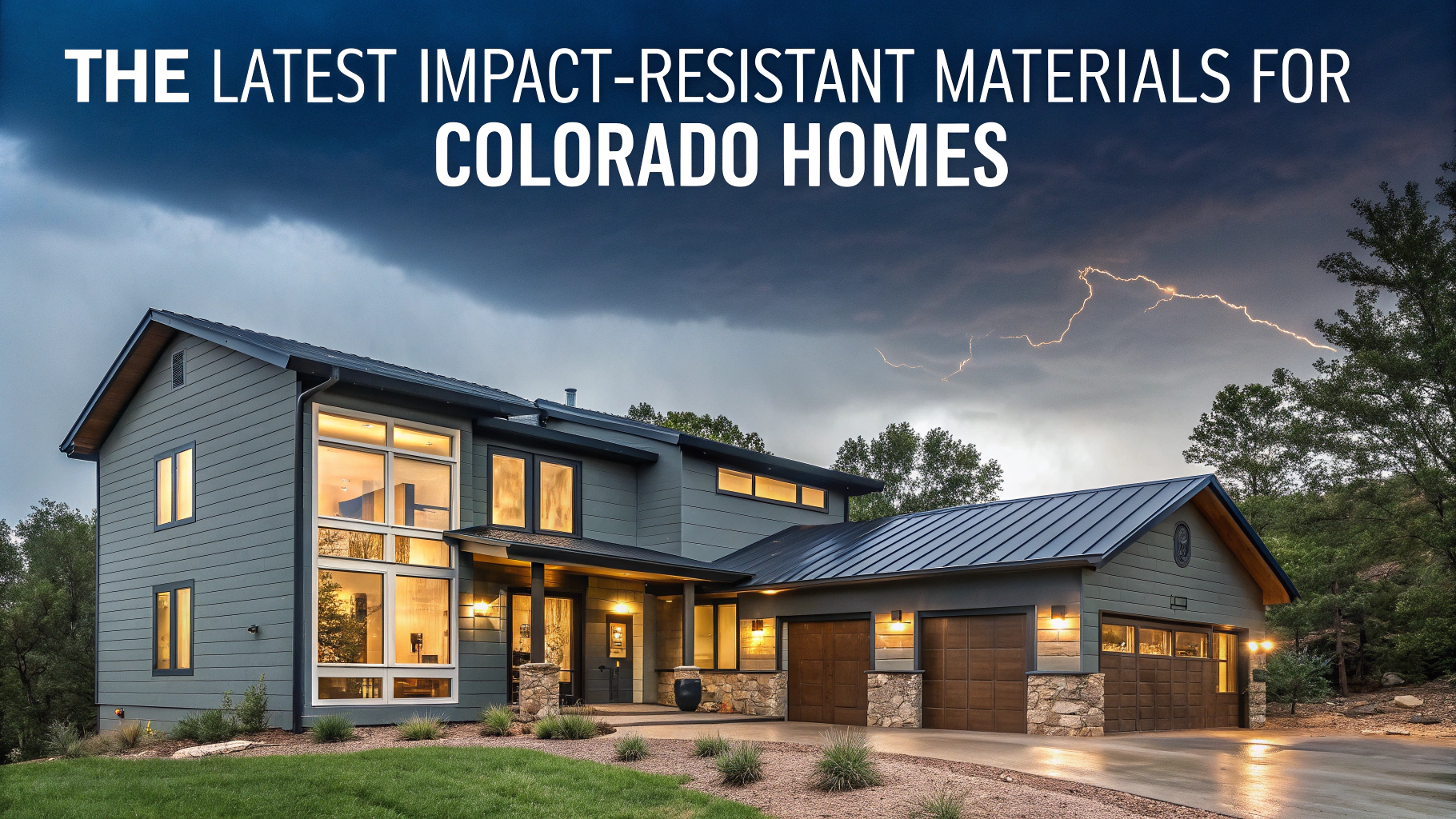Colorado homeowners face unique challenges from severe hailstorms, heavy snow, and intense UV exposure that can damage traditional roofing materials.
Modern impact-resistant materials have emerged as a game-changing solution, offering superior protection while potentially reducing insurance costs.
This guide breaks down the most effective impact-resistant roofing options available for Colorado homes, helping you make an informed decision for your next roof replacement.
Top Impact-Resistant Roofing Materials
- Class 4 Impact-Resistant Shingles
- Made with specialized rubber-like materials
- UL 2218 certified for highest impact resistance
- 15-30% longer lifespan than standard shingles
- Average cost: $450-650 per square (100 sq ft)
- Stone-Coated Steel
- Withstands hail up to 2.5 inches in diameter
- 50+ year lifespan
- Energy efficient in summer and winter
- Average cost: $800-1,000 per square
- Synthetic Slate
- Looks like natural slate without the weight
- Class 4 impact rating
- 50-year warranty common
- Average cost: $900-1,300 per square
Insurance Benefits
Many Colorado insurance providers offer premium discounts of 5-30% for homes with certified impact-resistant roofing.
| Insurance Company | Typical Discount |
|---|---|
| State Farm | 15-25% |
| USAA | 10-20% |
| Farmers | 5-15% |
Installation Considerations
- Choose a certified installer with experience in impact-resistant materials
- Verify proper underlayment installation for maximum protection
- Ensure compliance with local building codes
- Check manufacturer warranty requirements
Contact the Colorado Roofing Association at (303) 484-0549 for certified contractor recommendations.
Maintenance Tips
- Inspect roof twice yearly (spring and fall)
- Document any hail damage for insurance claims
- Clear debris regularly from valleys and gutters
- Schedule professional inspections after major storms
Making Your Decision
Consider factors like budget, aesthetic preferences, and long-term value when selecting impact-resistant roofing.
Request quotes from at least three certified contractors to compare options and ensure competitive pricing.
Contact your insurance provider before installation to confirm available discounts and documentation requirements.
Environmental Impact
Impact-resistant roofing materials offer several environmental benefits for Colorado homeowners:
- Many materials contain recycled content
- Longer lifespan reduces landfill waste
- Energy-efficient options lower cooling costs
- Some materials are 100% recyclable at end-of-life
Cost Analysis
Initial Investment vs. Long-Term Savings
- Higher upfront costs offset by:
- Reduced insurance premiums
- Lower maintenance costs
- Extended replacement intervals
- Potential energy savings
| Material Type | Average ROI Timeline |
|---|---|
| Class 4 Shingles | 7-10 years |
| Stone-Coated Steel | 12-15 years |
| Synthetic Slate | 15-20 years |
Seasonal Performance
- Summer Protection
- UV resistance prevents material degradation
- Reflective options reduce cooling costs
- Superior hail protection during storm season
- Winter Benefits
- Excellent snow load capacity
- Resistant to freeze-thaw cycles
- Enhanced insulation properties
Protecting Your Colorado Home
Impact-resistant roofing represents a smart investment for Colorado homeowners, combining durability with long-term cost savings. The initial premium pays dividends through reduced maintenance, lower insurance costs, and enhanced home protection.
When properly installed and maintained, these materials provide decades of reliable service against Colorado’s challenging weather conditions. Consult with certified contractors and your insurance provider to select the optimal solution for your specific needs and budget.
FAQs
1. What are the best impact-resistant roofing materials available for Colorado homes?
Class 4 impact-resistant materials including modified asphalt shingles, concrete tiles, metal roofing, and polymer-based synthetic shingles are ideal for Colorado’s harsh weather conditions.
2. How do impact-resistant materials protect against Colorado’s frequent hail storms?
Impact-resistant materials are designed to absorb and disperse the energy from hail impacts, preventing cracks, splits, and penetration, with Class 4 materials capable of withstanding 2-inch hail strikes.
3. What is the cost difference between standard and impact-resistant roofing materials?
Impact-resistant materials typically cost 20-30% more than standard roofing materials, but insurance companies often offer premium discounts of 5-30% for homes with certified impact-resistant roofs.
4. How long do impact-resistant roofs last in Colorado’s climate?
Quality impact-resistant roofs can last 30-50 years depending on the material, with metal roofing lasting up to 50 years, and impact-resistant asphalt shingles lasting 30-35 years.
5. What are the insurance benefits of installing impact-resistant roofing in Colorado?
Many Colorado insurance companies offer significant premium discounts for homes with UL 2218 or FM 4473 Class 4 rated impact-resistant roofs, as these materials reduce hail damage claims.
6. How do impact-resistant materials perform in extreme temperature fluctuations?
Quality impact-resistant materials are designed to withstand Colorado’s dramatic temperature changes, resisting thermal expansion and contraction that can cause cracking and deterioration.
7. What testing standards verify a roofing material’s impact resistance?
UL 2218 and FM 4473 are the primary testing standards, with Class 4 being the highest rating, indicating the material can withstand the impact of a 2-inch steel ball dropped from 20 feet.
8. Which impact-resistant roofing material offers the best value for Colorado homes?
Class 4 modified asphalt shingles typically offer the best value, combining excellent impact resistance with reasonable cost, long lifespan, and significant insurance premium savings.
9. How do impact-resistant materials handle Colorado’s heavy snow loads?
Impact-resistant materials, particularly metal and synthetic options, are engineered to support heavy snow loads and resist ice dam formation common in Colorado winters.
10. Can impact-resistant roofing materials be recycled?
Metal roofing is 100% recyclable, while many modern impact-resistant synthetic and modified asphalt materials are partially recyclable at specialized facilities.
